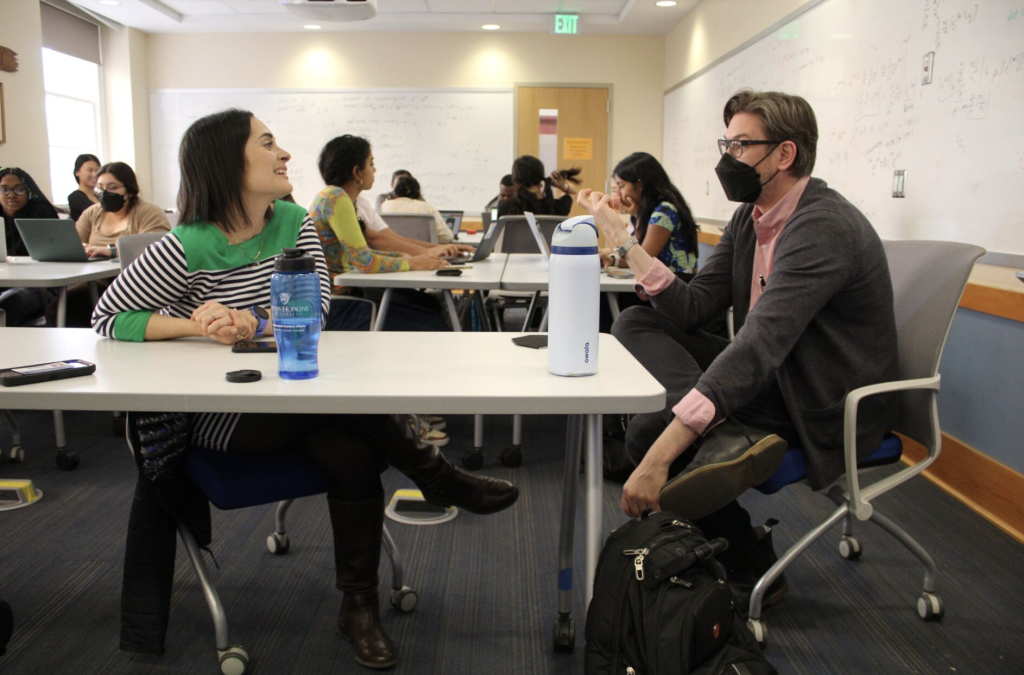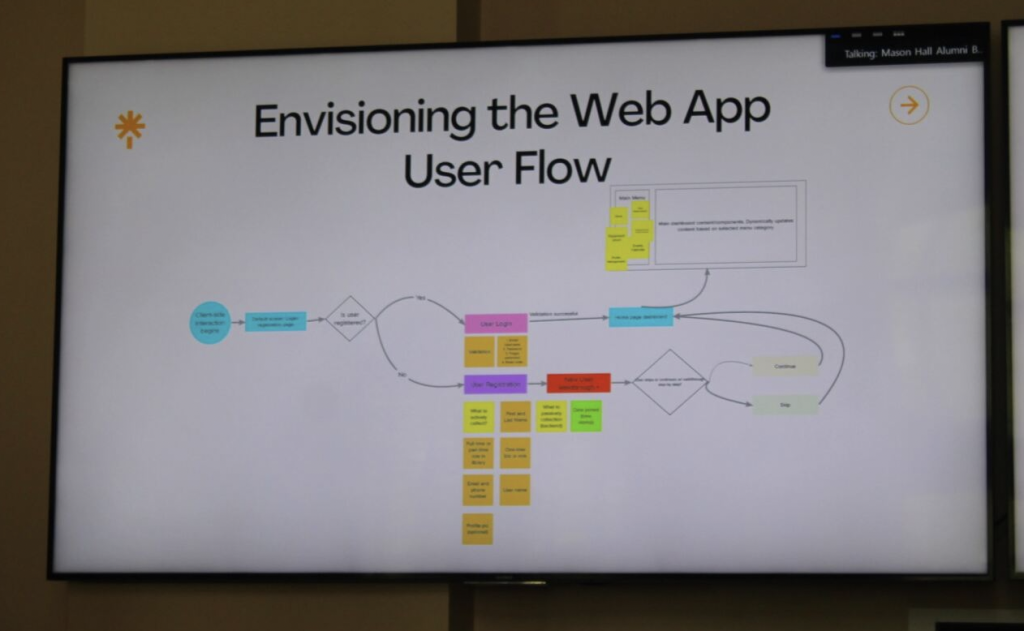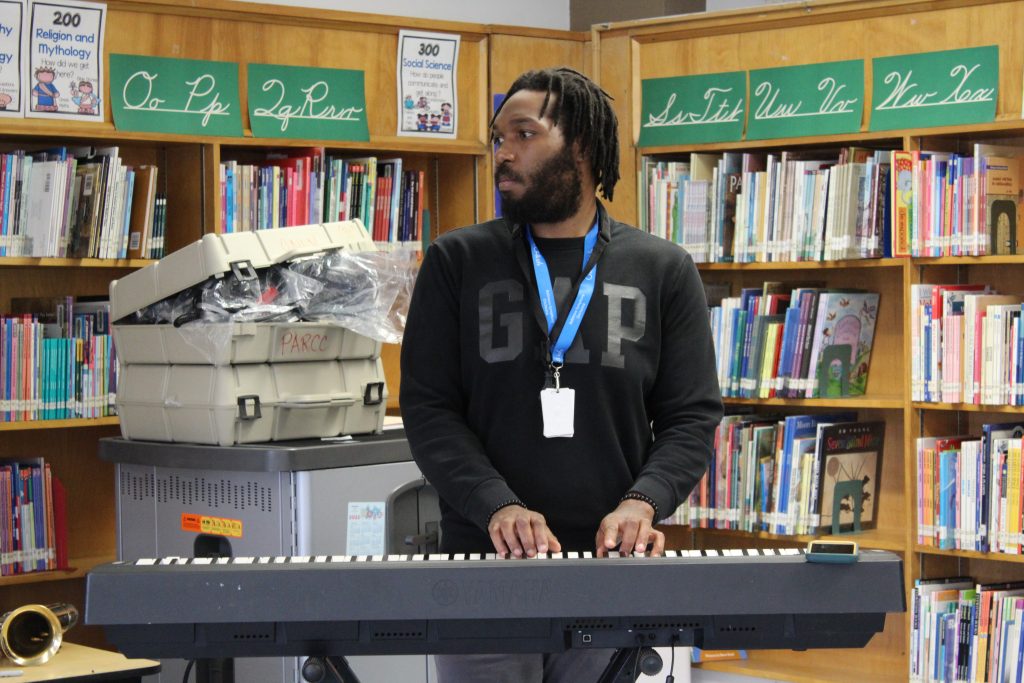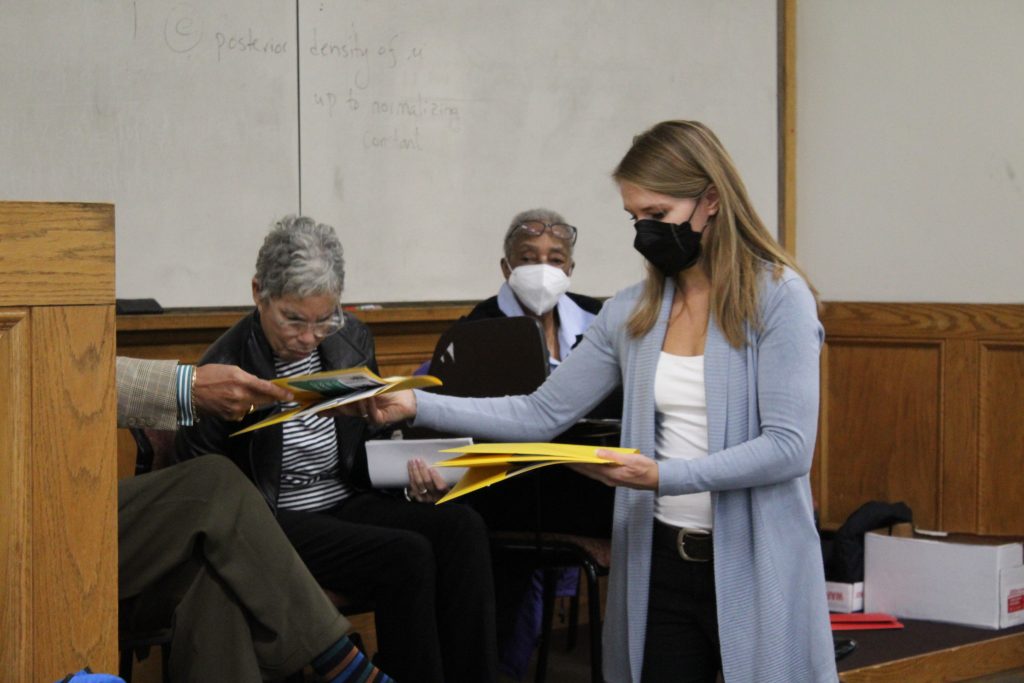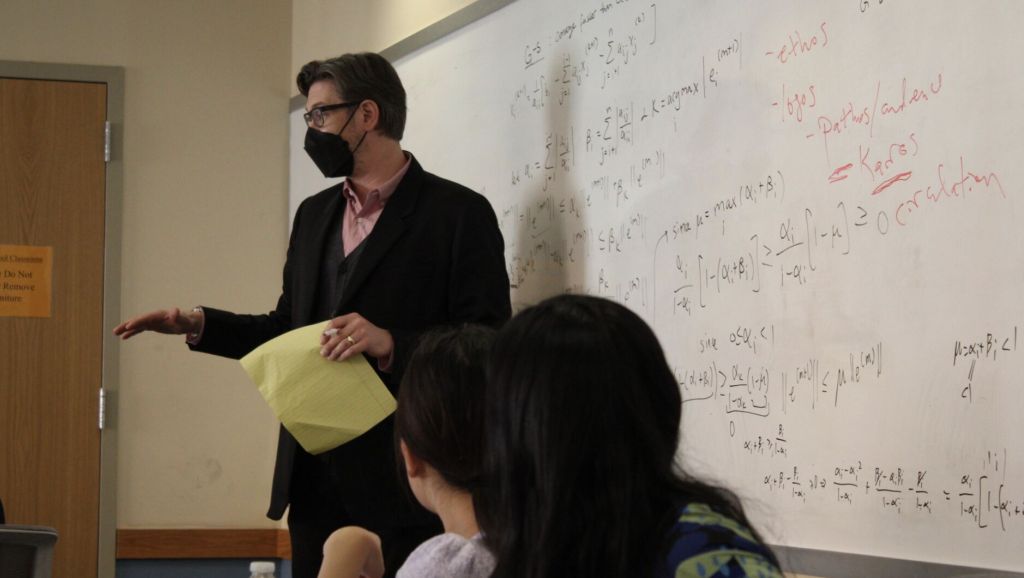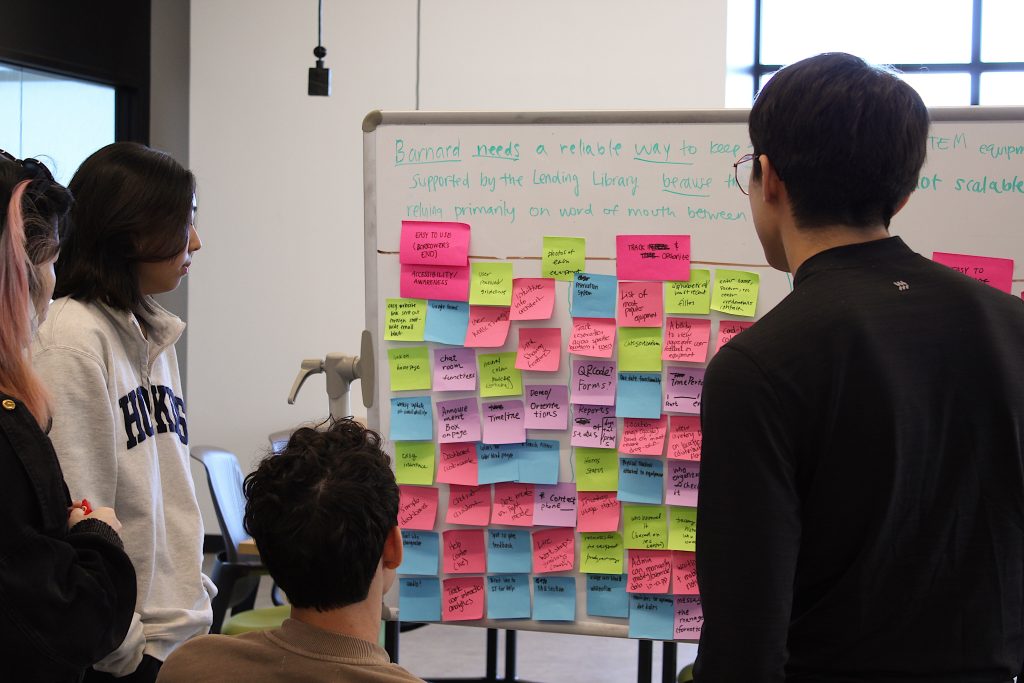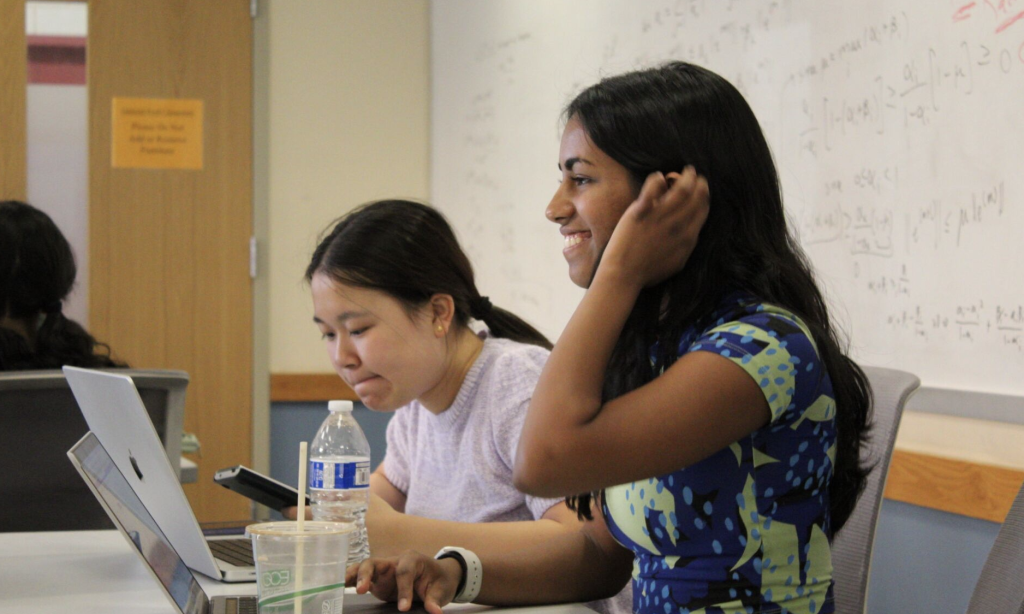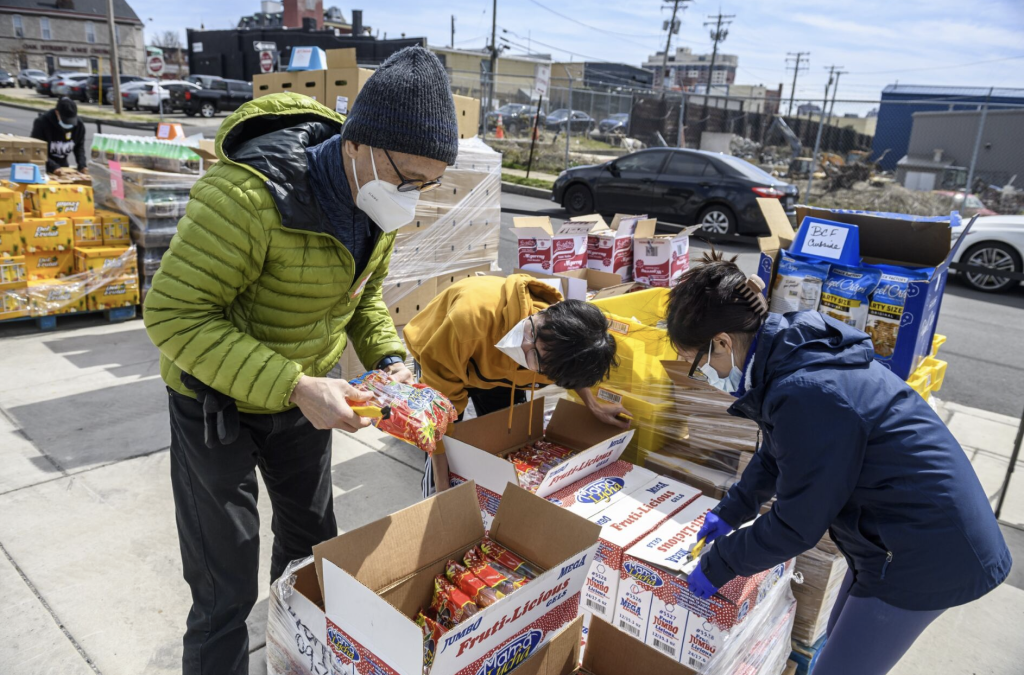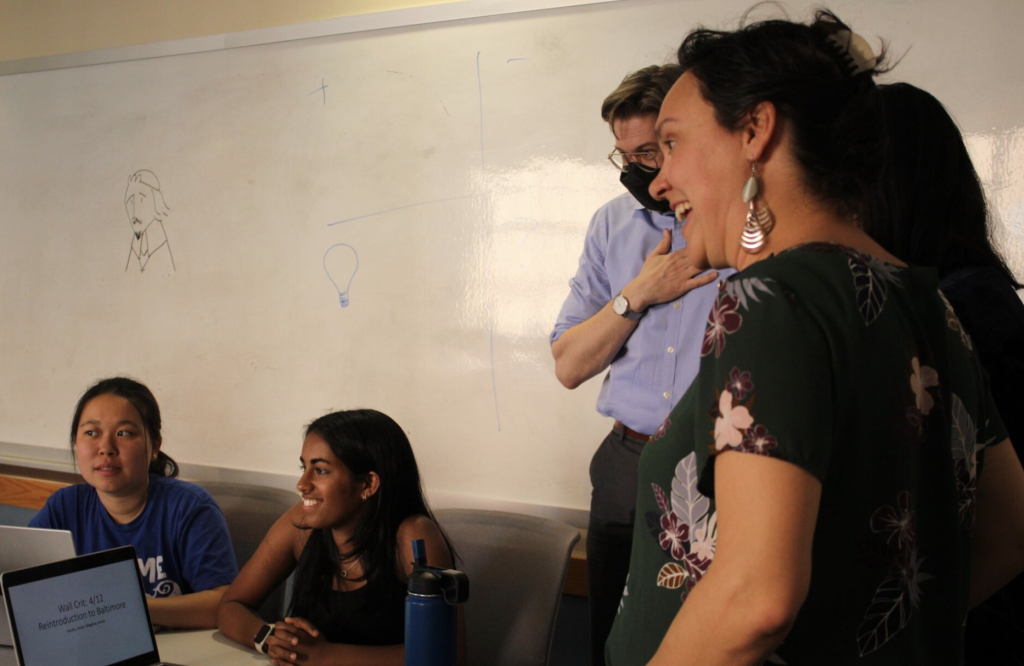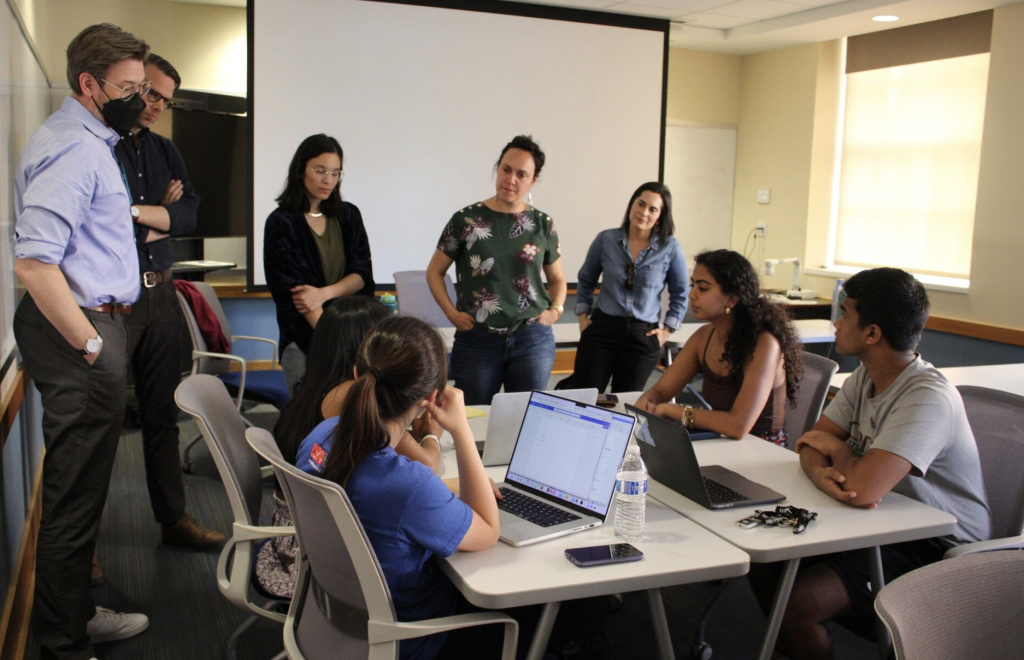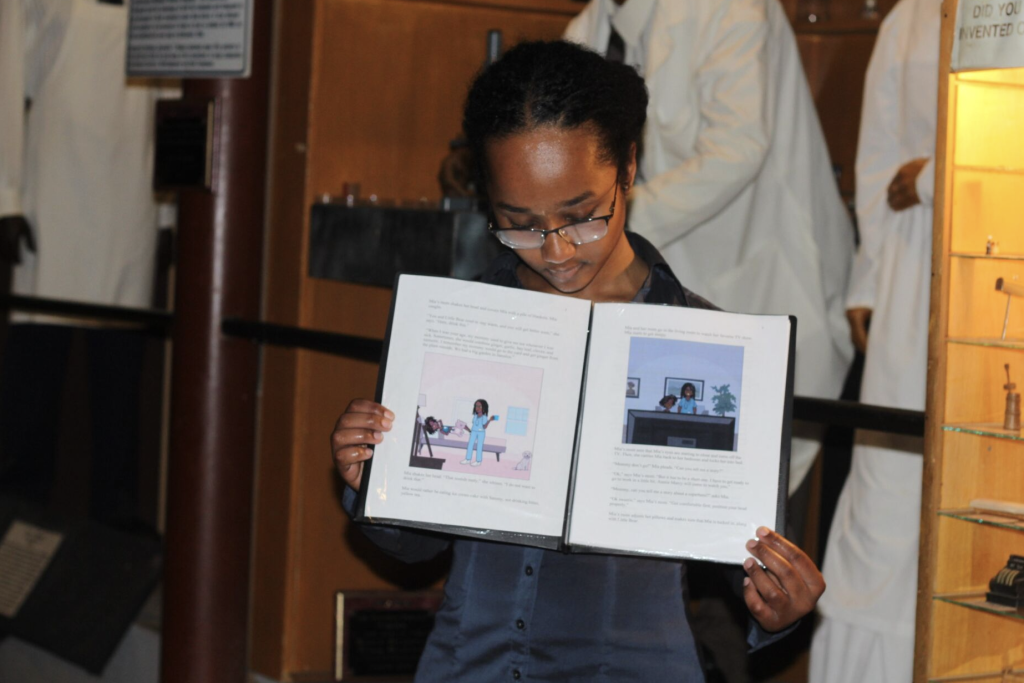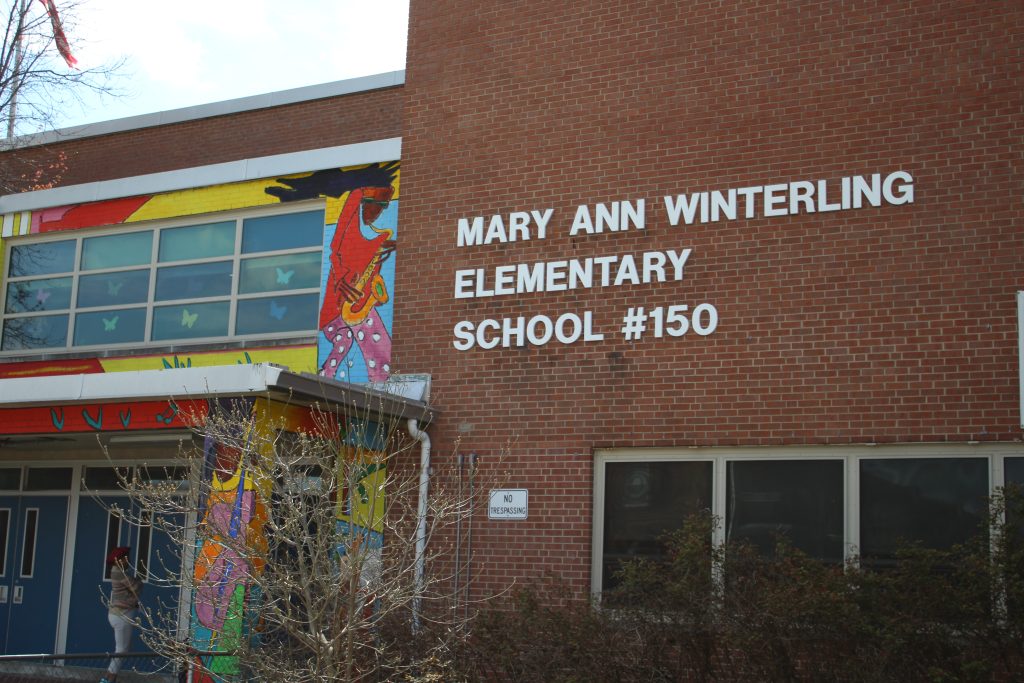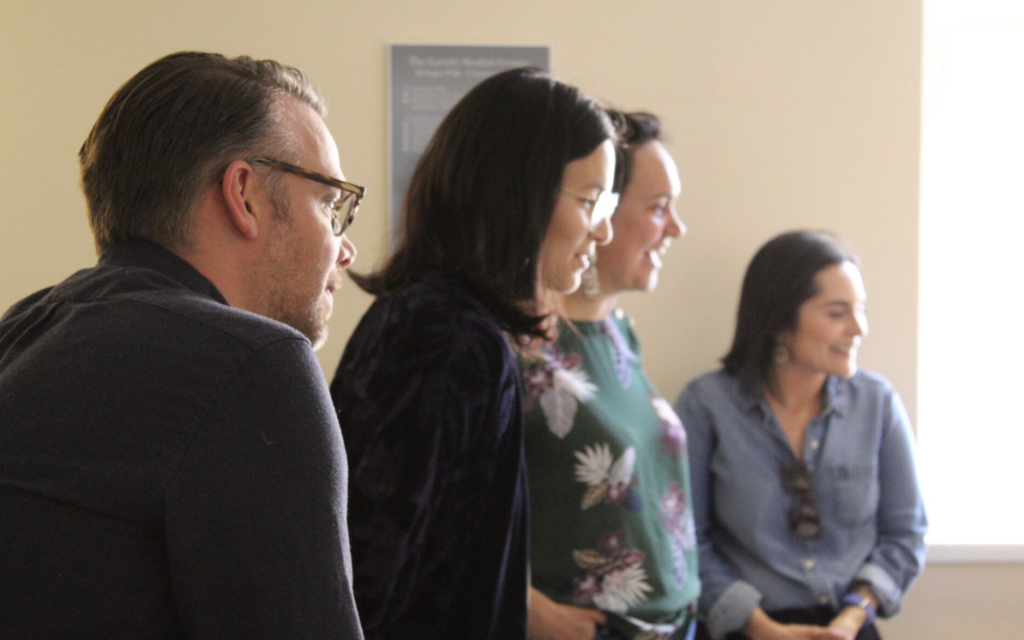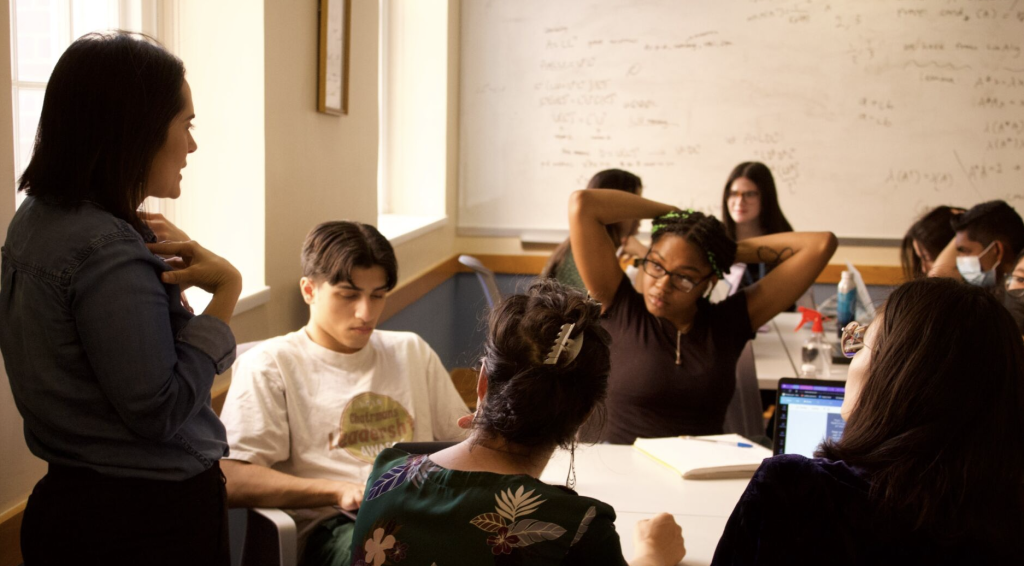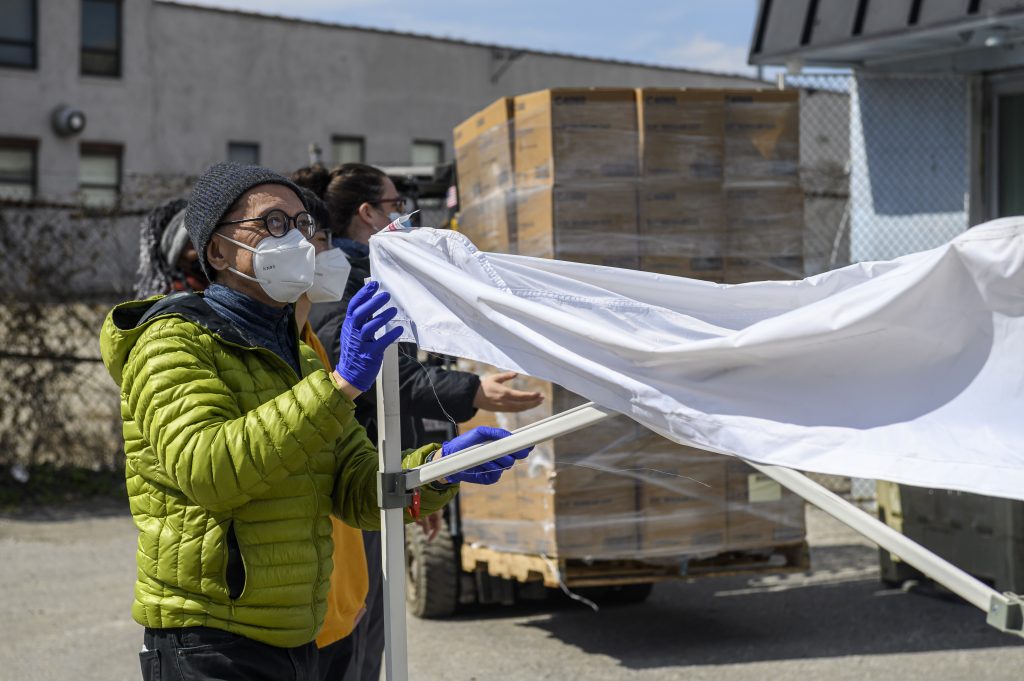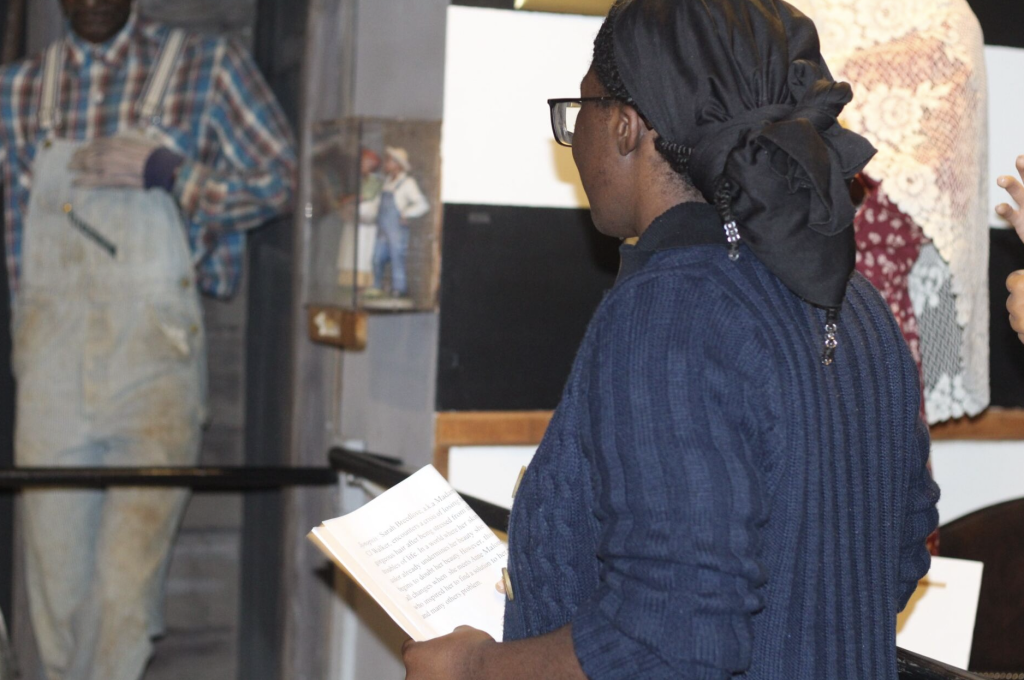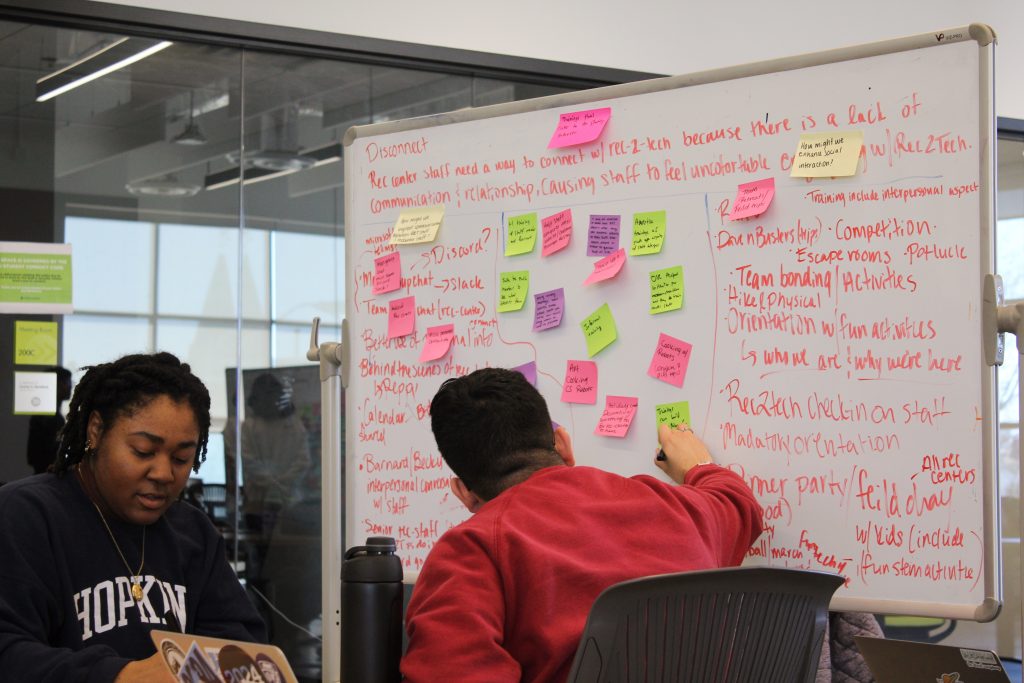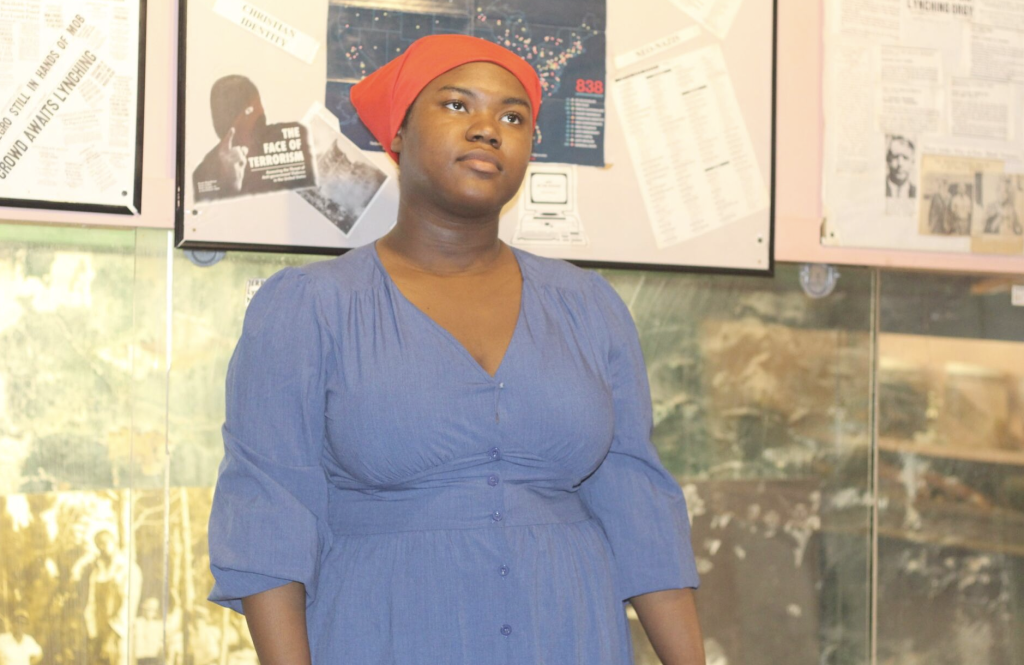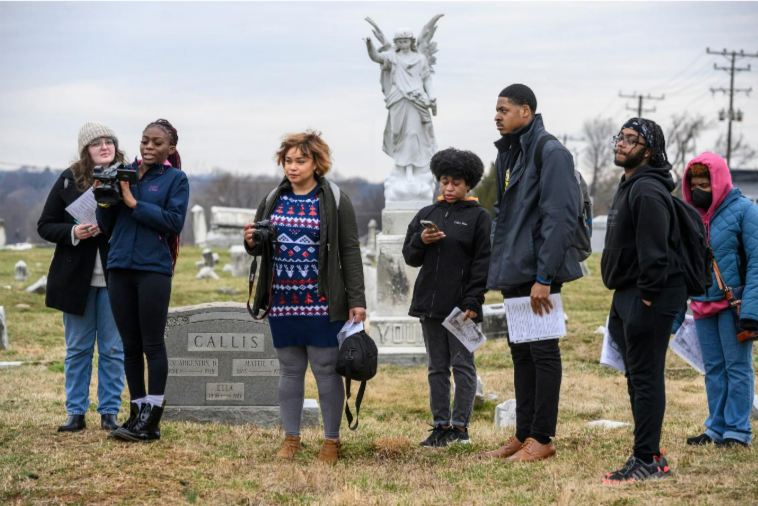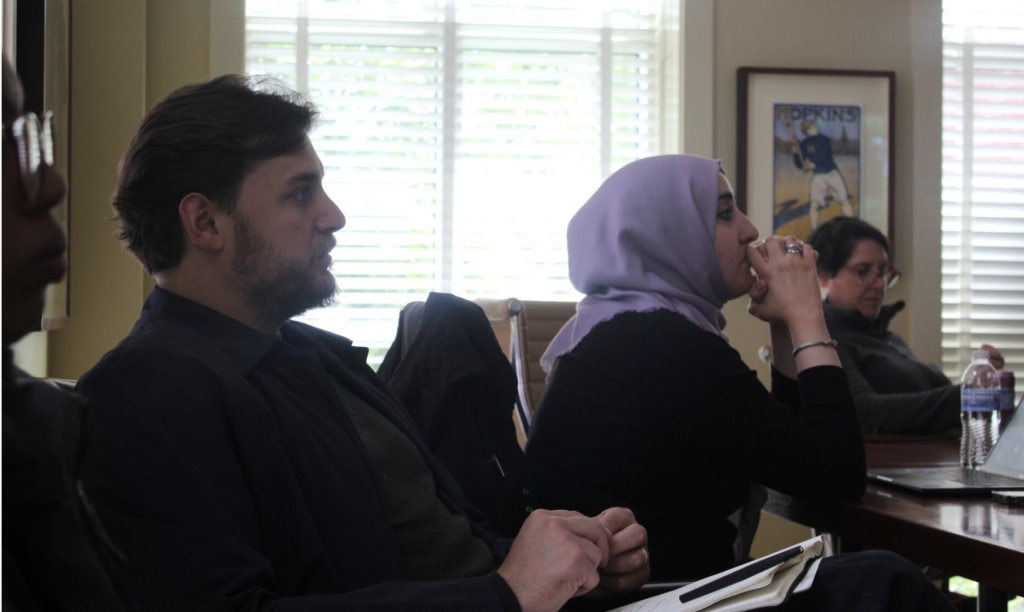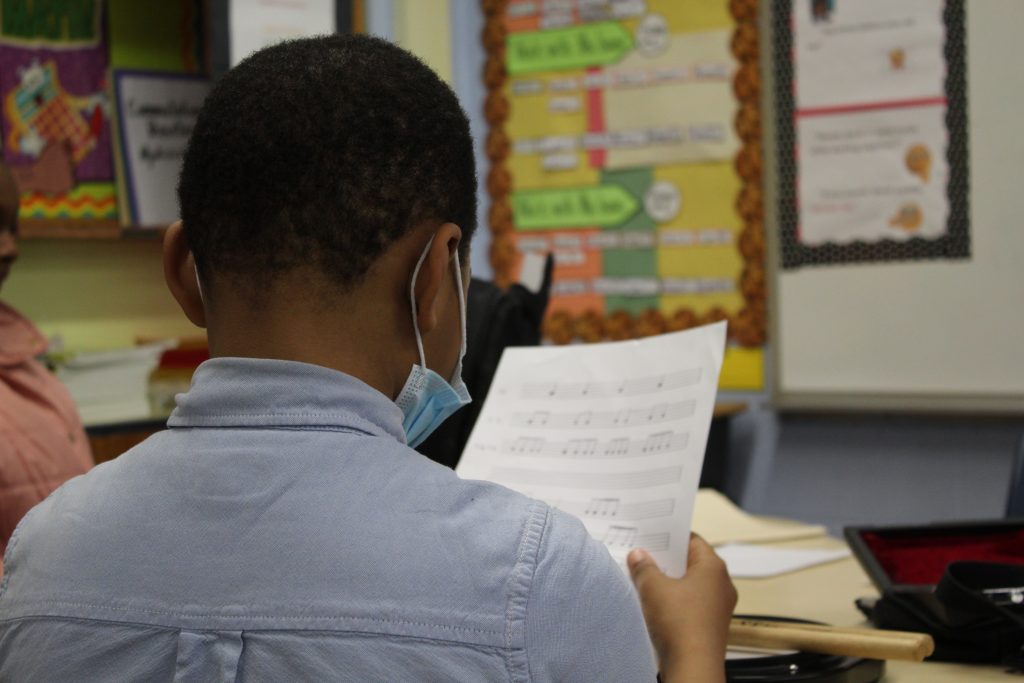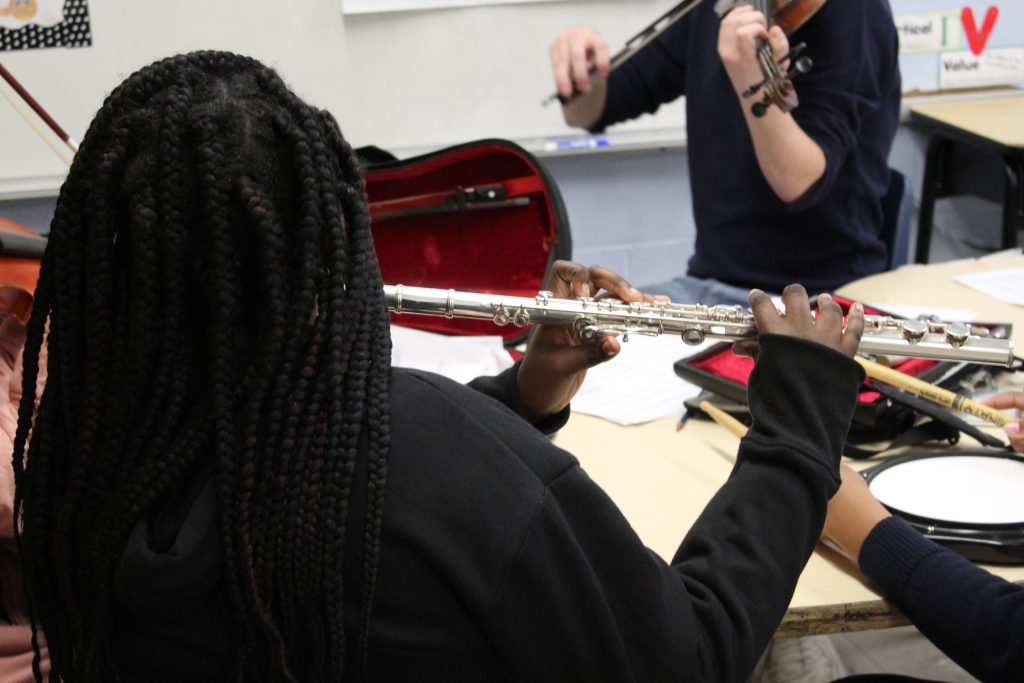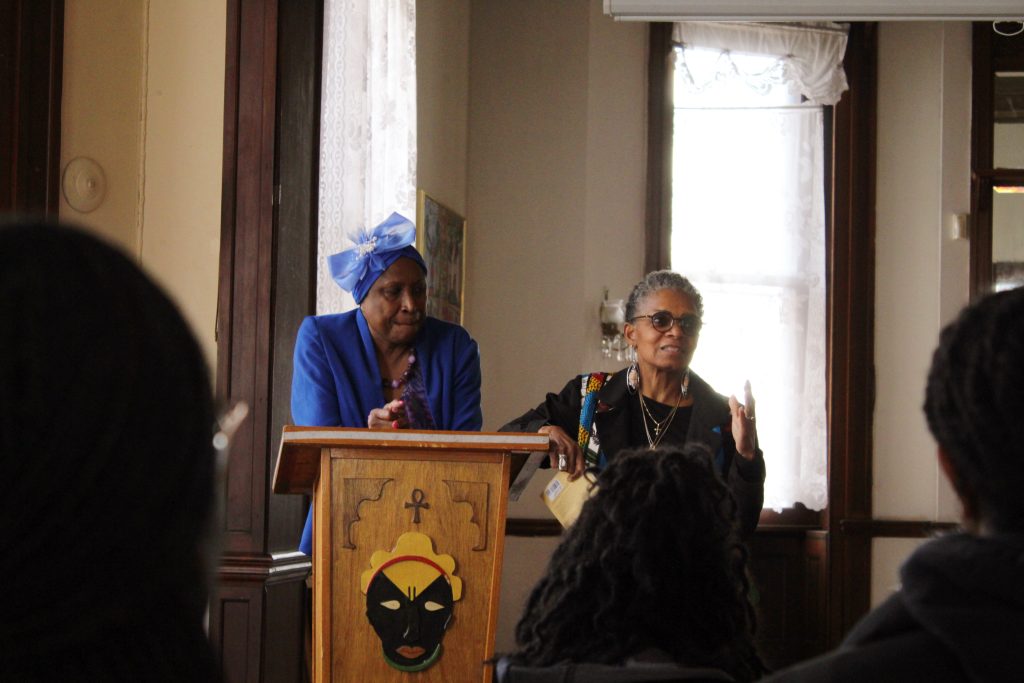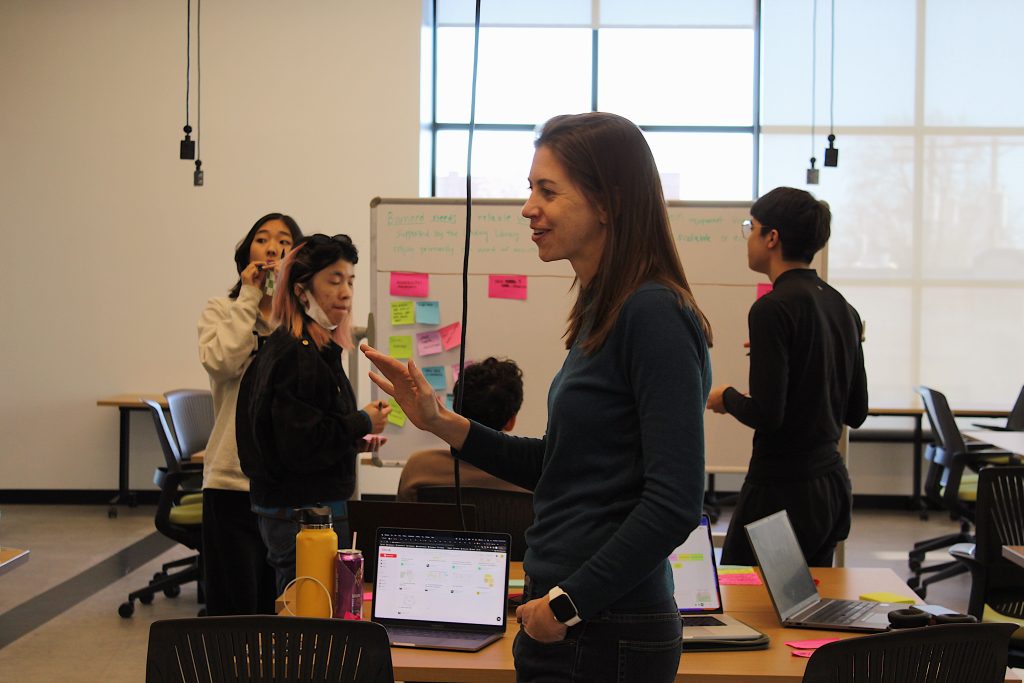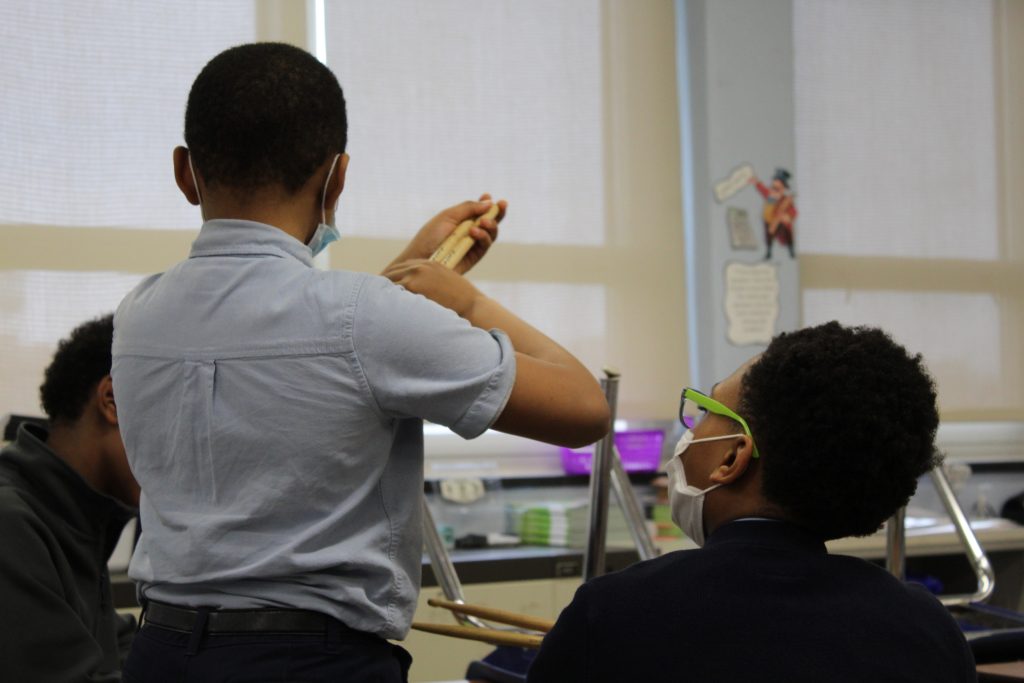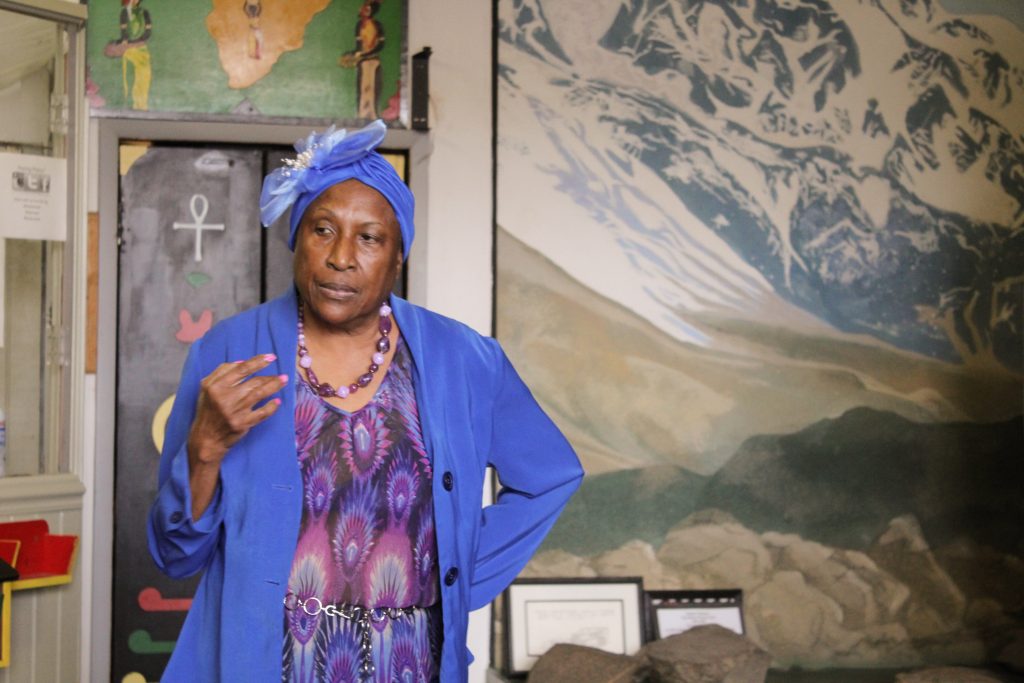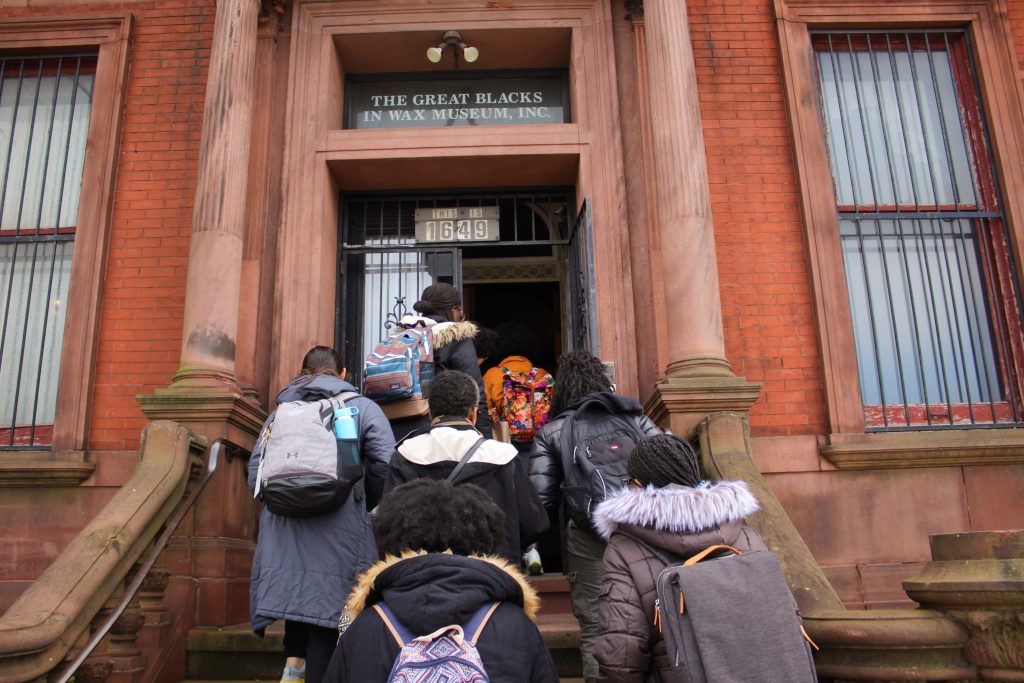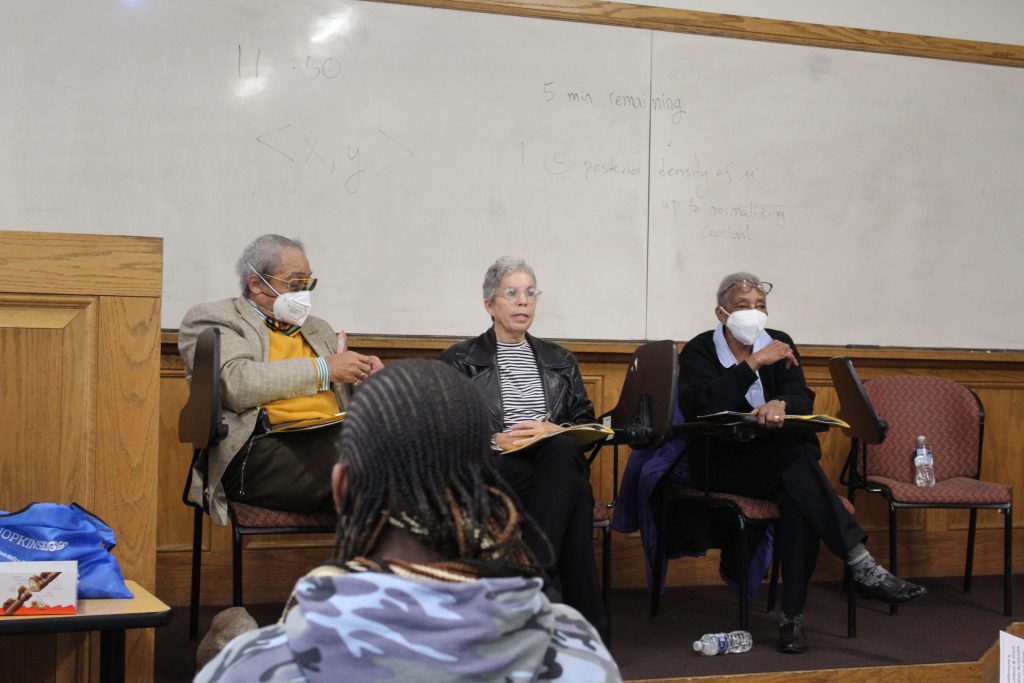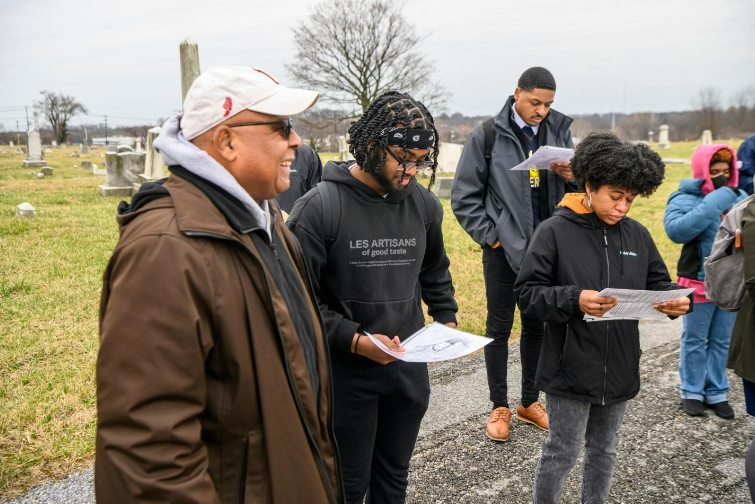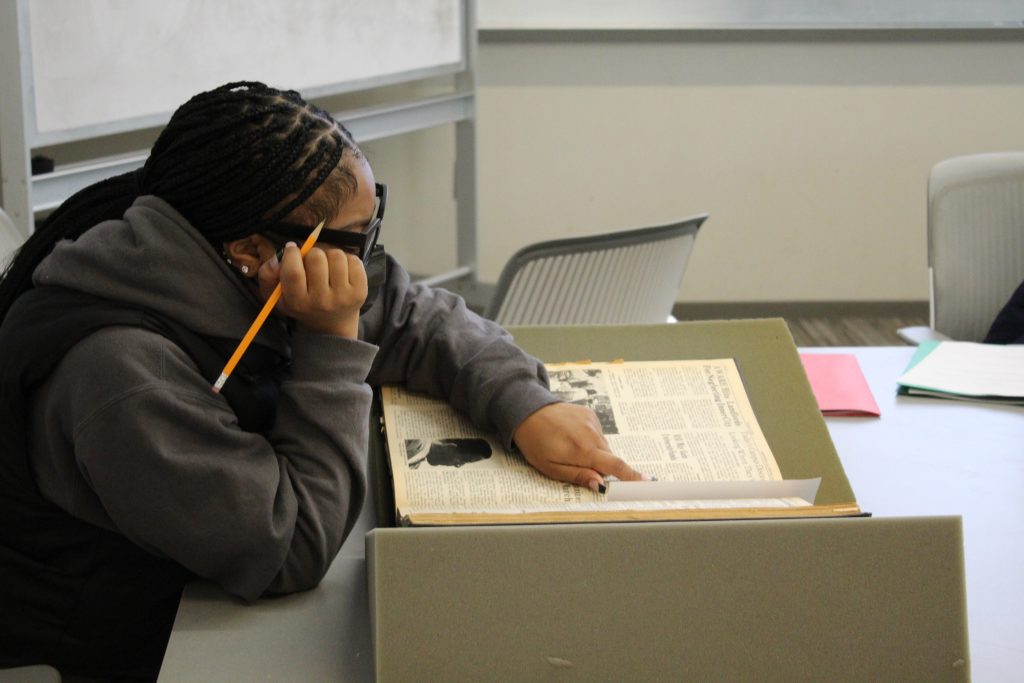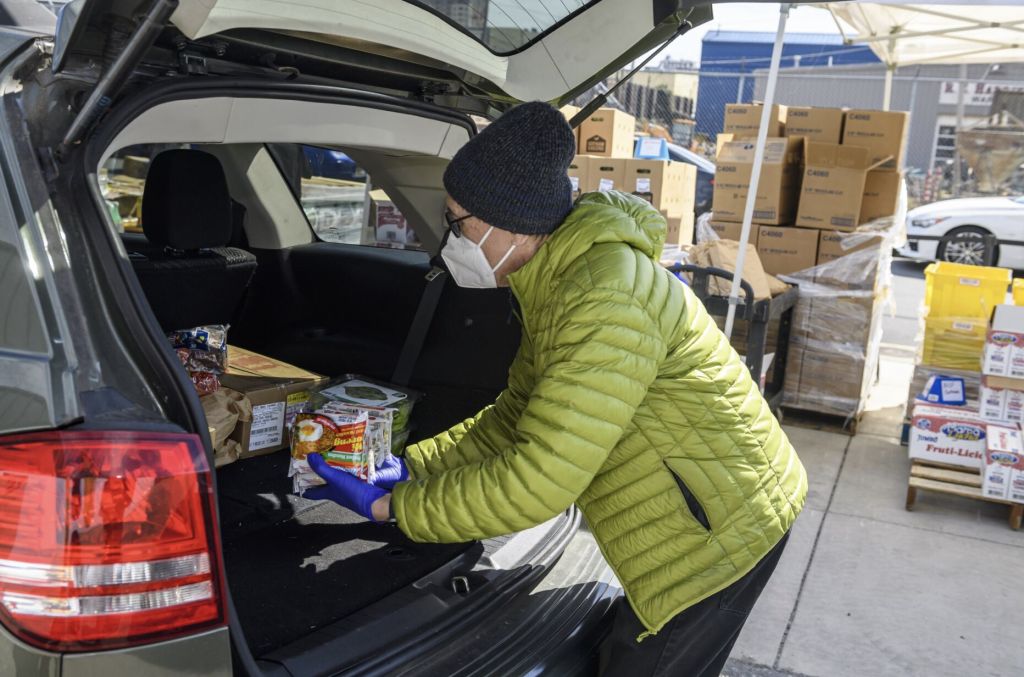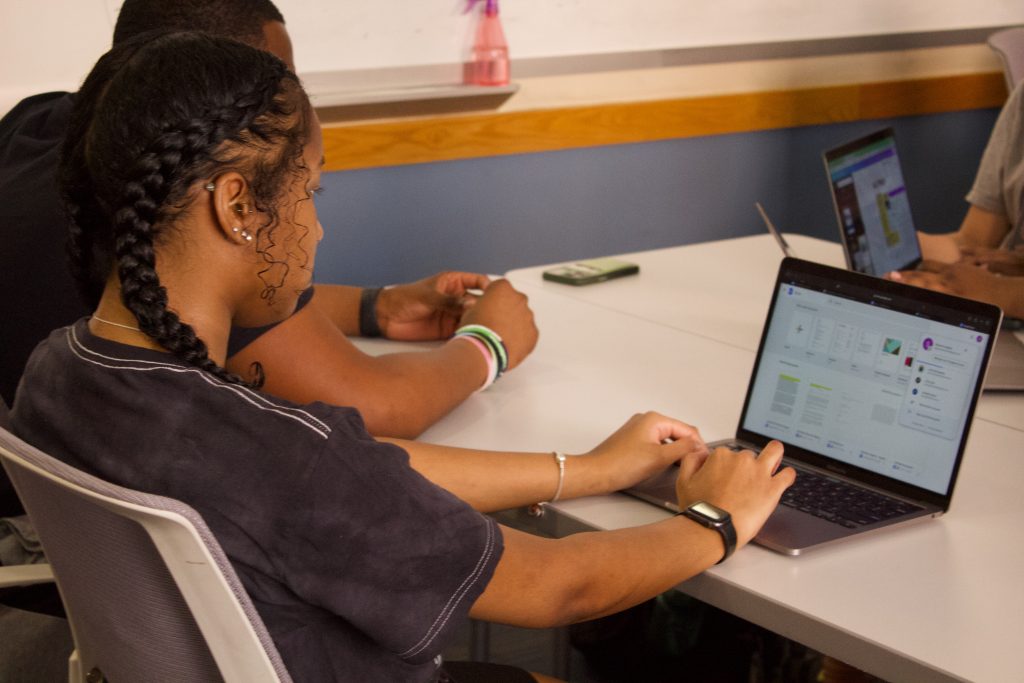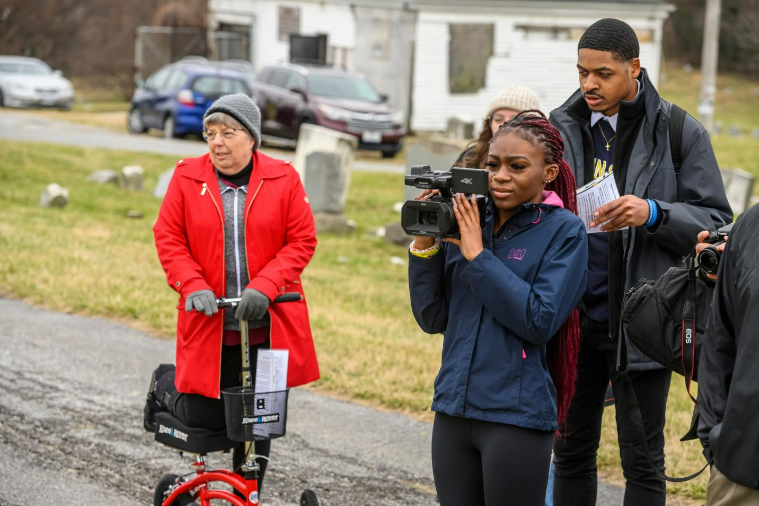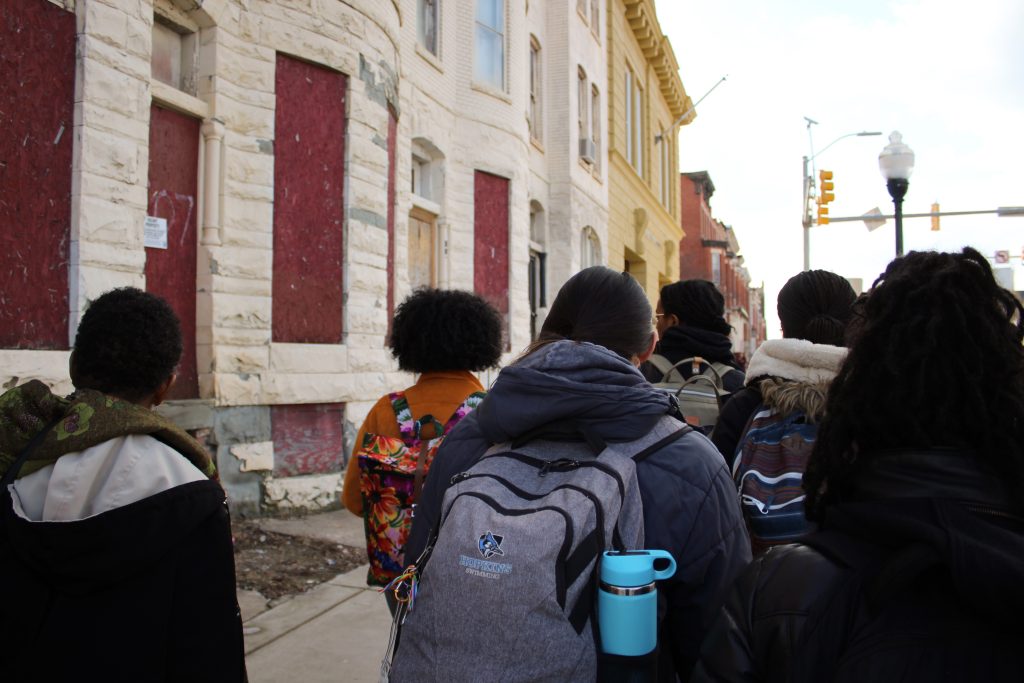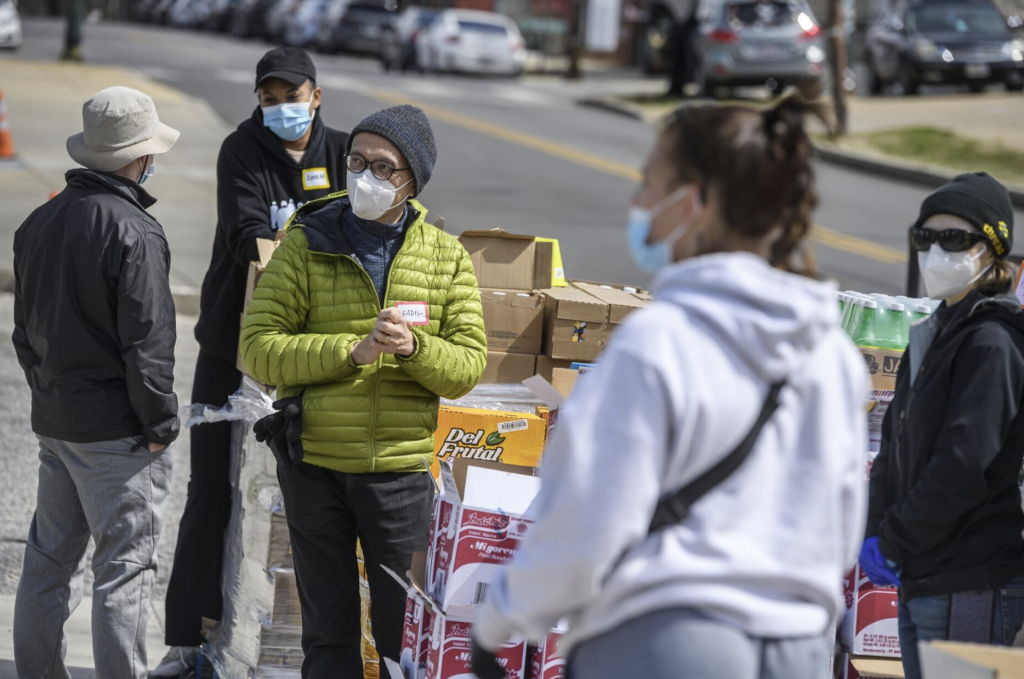Engaged Scholar Faculty and Community Partner Fellows Program
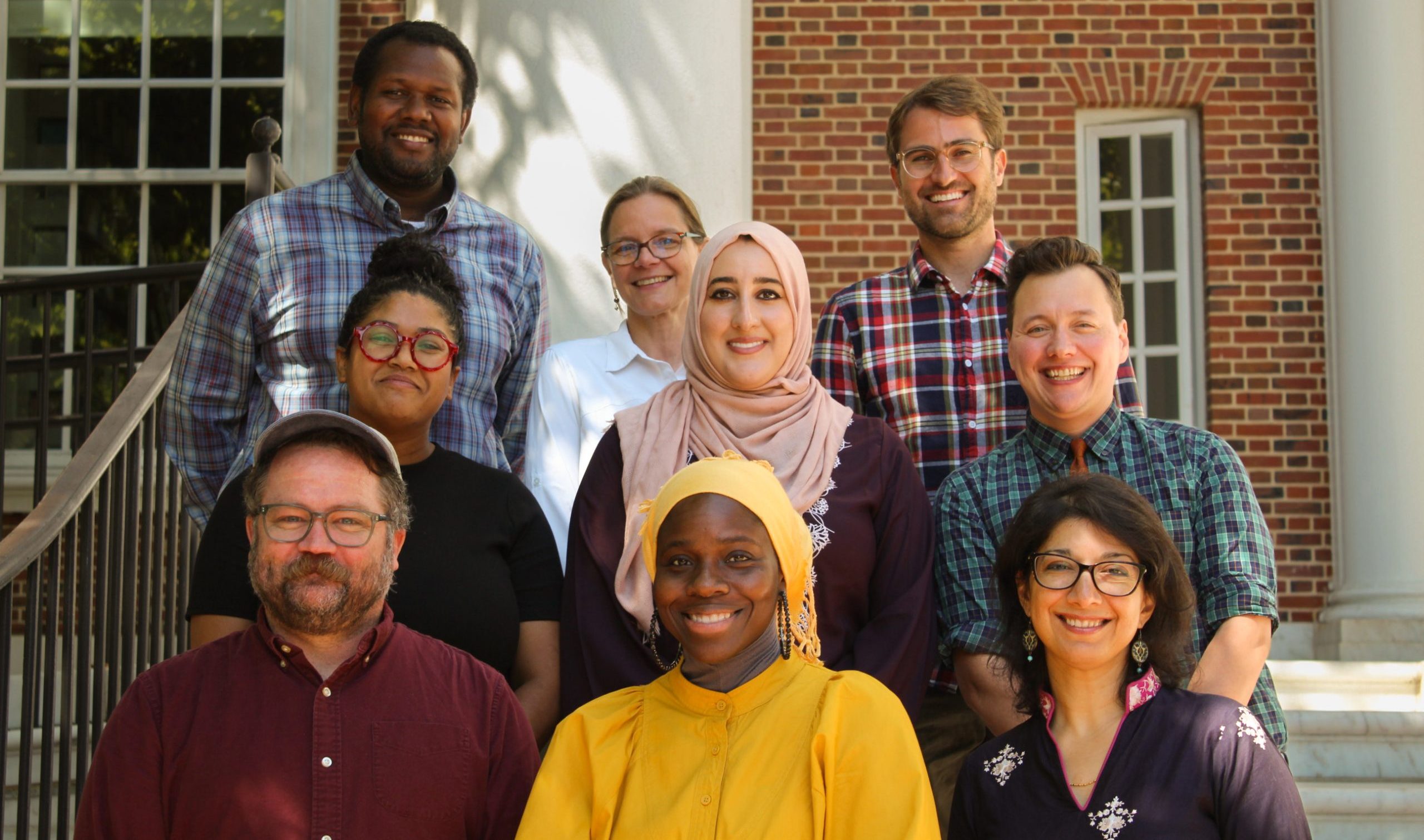
The Engaged Scholar Faculty & Community Partner Fellows Program is a cohort-based program housed at the Center for Social Concern that facilitates the development and implementation of mutually beneficial Community-Based Learning courses.
Community-Based Learning is a high-impact pedagogy that connects Faculty and Community Partners as co-educators for the purpose of prompting students to critically think about social and civic issues, while simultaneously meeting community partner/education partner-identified goals.
By encouraging a greater role for CBL at Johns Hopkins, the CSC is working to provide community members a greater voice in campus life and bridging gaps between the Homewood campus and surrounding communities.
How to Become a Faculty Fellow
Benefits
Expertise and knowledge can be found all throughout Baltimore City. Community Partners are immersed in non-profit, community organizing, and/or civic work, and hold a wealth of knowledge and resources that can powerfully contribute to the Hopkins student experience. The Engaged Scholar Program seeks to identify community partner co-educators who have the capacity to co-develop and co-implement a community-based learning course alongside a faculty partner.
Engaged Scholar Faculty & Community Partner fellows each receive a $2,000 co-educator stipend for the year and up to $1,000 in additional funding for CBL course logistics.
In addition to funding, the Faculty Fellows also receive training and logistical support through the Center for Social Concern.
Role and Responsibilities
- Teach a community-based learning course for students in either the Krieger School of Arts & Sciences, the Whiting School of Engineering, and/or Peabody during the spring of 2025.
- Co-educate alongside a community partner C0-Educator(s). Faculty and community partner Co-Educators should design/review the course syllabus together and determine mutually agreed upon feedback and metrics for course success.
- Participate in a two-day orientation to be held during the end of Summer 2024 (mid-August).
- Attend once a month, one-hour cohort development sessions during the following months: September, October, November, February, March, and April. The date and time of these sessions will be scheduled ahead of time, with the cohort’s input.
- Complete a program evaluation offering feedback to the Assistant Director of Engaged Scholarship about the Engaged Scholars Program.
- Whenever possible, connect Co-Educators to Hopkins resources.
Become a Faculty Fellow
The Engaged Scholar Fellows Program is an application-based program. Faculty applicants will be contacted shortly after submitting their application with next steps. Faculty applicants do not need to have a Community Partner co-educator identified by the time that their application is submitted. The Center for Social Concern can facilitate the process of connecting Faculty Fellows to Baltimore City-based Community Partner co-educator(s) as potential partners.
Application Process and Procedures
Applications for the 2024–25 cohort will be due Sunday, March 10, 2024. Faculty applicants do not need to have a Community Partner co-educator identified by the time that their application is submitted. The Center for Social Concern can help introduce Faculty Fellows to potential Baltimore City-based Community Partner co-educator(s). Please contact volunteer@jhu.edu with any questions.
Engaged Scholar Faculty and Community Partner Fellows 2023-24 Cohort
Dr. Homayra Ziad (Director, Program in Islamic Studies)
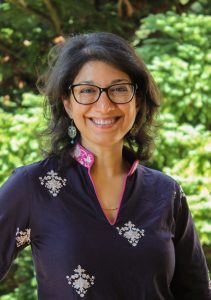 Homayra Ziad is a scholar-activist, educator and writer, and Director of the Program in Islamic Studies at Johns Hopkins University. After receiving a doctorate in Islamic Studies from Yale, she was Assistant Professor of Religion at Trinity College in Hartford. She then spearheaded education on Islam and engagement with Muslim communities at an interfaith educational non-profit in Baltimore (the Institute of Islamic, Christian and Jewish Studies), where she helped teachers, activists and emerging religious leaders explore the intersections of religion and social justice.
Homayra Ziad is a scholar-activist, educator and writer, and Director of the Program in Islamic Studies at Johns Hopkins University. After receiving a doctorate in Islamic Studies from Yale, she was Assistant Professor of Religion at Trinity College in Hartford. She then spearheaded education on Islam and engagement with Muslim communities at an interfaith educational non-profit in Baltimore (the Institute of Islamic, Christian and Jewish Studies), where she helped teachers, activists and emerging religious leaders explore the intersections of religion and social justice.
Homayra believes deeply in the pedagogy of community-engaged learning and serves on the project team of Art, Religion and Cities, a Morgan State initiative that explores the display of religious art in museums to engage critical questions of race, justice, and community, and connects students to internship opportunities at cultural institutions. Homayra has fifteen years of experience in interreligious education and programming and was founding co-chair of the American Academy of Religion’s Interreligious and Interfaith Studies Group. She is co-editor of Words to Live By: Sacred Sources for Interreligious Engagement (Orbis Press, 2018). She has written for many academic and popular venues, and consulted and created programs for film and media. Homayra is the Board President of the ACLU of Maryland.
Dr. Nusaybah Abu-Mulaweh (Lecturer, Center for Leadership Education)
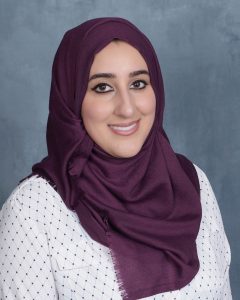 Dr. Nusaybah Abu-Mulaweh is a faculty member in the Multidisciplinary Design Program within the Center for Leadership Education at Johns Hopkins. She teaches design courses that apply a human-centered approach that focuses on grounding designs in the needs of users throughout the entire design process.
Dr. Nusaybah Abu-Mulaweh is a faculty member in the Multidisciplinary Design Program within the Center for Leadership Education at Johns Hopkins. She teaches design courses that apply a human-centered approach that focuses on grounding designs in the needs of users throughout the entire design process.
Before joining Hopkins, she earned her BS and MS in electrical and computer engineering, and her PhD in engineering education from Purdue University. Dr. Abu-Mulaweh also taught in the EPICS Program, a large multidisciplinary community-engaged design program at Purdue University. She mentored multidisciplinary teams who worked with community partners through a human-centered design process. Working with community partners and yearning to enhance the understanding of others while working on design challenges inspired her dissertation, which focused on empathy development for undergraduate engineering students in community-engaged design courses.
Her research continues to focus on empathy in engineering, and she is very passionate about integrating empathy development in engineering at Hopkins to foster a more inclusive culture in which students learn to respond innovatively and responsibly to global challenges.
Dr. Anne-Elizabeth Brodsky (University Writing Program)
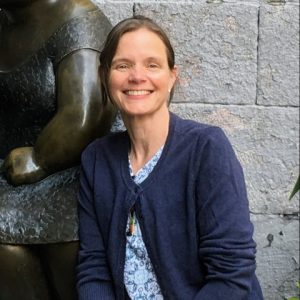 Anne-Elizabeth Brodsky teaches in the University Writing Program, where her courses center on American education, race, literature, and friendship. She is co-founder and faculty director of the Common Question.
Anne-Elizabeth Brodsky teaches in the University Writing Program, where her courses center on American education, race, literature, and friendship. She is co-founder and faculty director of the Common Question.
Anne-Elizabeth served as co-chair of the Women Faculty Forum from 2016-19 and as a member of the Johns Hopkins Diversity Leadership Council from 2010-16. She collaborates with the JUMP & Hop-In programs and the Center for Teaching Excellence and Innovation and is a member of the Baltimore Scholars Steering Committee, a lapsed violinist in the Hopkins Symphony Orchestra, and a Baltimore City Public Schools parent.
Before joining the Hopkins faculty, Anne-Elizabeth was a senior program manager at the JHU Center for Talented Youth, where she ran summer programs for academically talented students in grades 2-9 and oversaw curriculum development. She has taught at the City Colleges of Chicago and Ida Crown Jewish Academy. Her dissertation, Teach the Nation: Pedagogies of Racial Uplift in US Women’s Writing of the 1890s, was published by Routledge in 2003.
Dr. Matthew Pavesich (Director and Teaching Professor, University Writing Program)
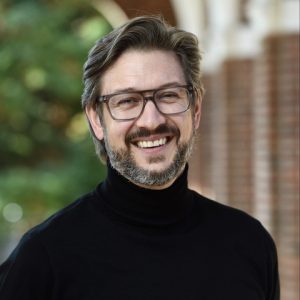 Matthew Pavesich is Director and Teaching Professor of the University Writing Program. He specializes in writing and rhetoric, pedagogy, and the public humanities. His current projects include a large-scale study of self-sponsored writing, or what people write beyond the requirements of work or school; and DC/Adapters, a photographic archive of visual rhetoric in Washington, D.C. He also serves on a national committee devoted to the cultivation of public humanities with the Rhetoric Society of America and on the editorial board of the Journal of Basic Writing.
Matthew Pavesich is Director and Teaching Professor of the University Writing Program. He specializes in writing and rhetoric, pedagogy, and the public humanities. His current projects include a large-scale study of self-sponsored writing, or what people write beyond the requirements of work or school; and DC/Adapters, a photographic archive of visual rhetoric in Washington, D.C. He also serves on a national committee devoted to the cultivation of public humanities with the Rhetoric Society of America and on the editorial board of the Journal of Basic Writing.
Before joining the faculty at Hopkins in 2021, Pavesich taught for ten years at Georgetown University, where he received the Provost’s Innovation in Teaching Award in 2020. His courses include innovative models for first-year writing and rhetoric, collaborative teaching in the disciplines, and graduate courses in the teaching of writing and the public and digital humanities; many of these courses connected with local communities in different ways. His work has appeared in enculturation, the WAC Journal, Technoculture, The Journal of Basic Writing, and several edited volumes. Pavesich completed his doctoral work in English (2009), specializing in rhetoric at the University of Illinois-Chicago. Learn more at matthewpavesich.me.
Lisa Wright (Lecturer, University Writing Programs)
Lisa E. Wright is a Lecturer in the University Writing Program. Her research interests and courses center on Black maternal health, with a particular focus on Black midwives.
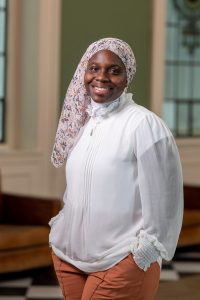 Lisa is working on a manuscript “The Ring of Fire: A Memoir” which chronicles her home births with her midhusband. It further examines Black women’s birthing choices, with a particular focus on the de-legitimization of Black midwives, and on creating safe birthing spaces inside and outside medical institutions.
Lisa is working on a manuscript “The Ring of Fire: A Memoir” which chronicles her home births with her midhusband. It further examines Black women’s birthing choices, with a particular focus on the de-legitimization of Black midwives, and on creating safe birthing spaces inside and outside medical institutions.
Prior to joining Hopkins, Wright co-founded the Talking Justice Project, an interactive workshop that teaches antiracist strategies for writing center consultants and teachers. Using antiracist pedagogy and inclusive writing center pedagogy, they provided attendees with strategies to address problematic ideas while also maintaining a learning environment. Her current project intersects faith and religious identities in our writing spaces. The co-edited collection The Politics of Faith and Secularism in Writing Centers and Writing Studies is under review at Utah State University Press.
Lisa was born and raised in Baltimore, Maryland. She holds a B.A. in English from Coppin State University and an M.A. from The Ohio State University in African and African American studies. Lisa completed her doctoral work at Oklahoma State University in English, specializing in Creative Writing Nonfiction and Black feminist literature. Her work has appeared in College English, The Writing Center Journal, Praxis, Axis, and Hippocampus Magazine.
Nadejda Webb (ACLS Postdoctoral Fellow, Center for Digital Humanities)
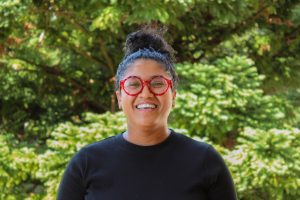 Nadejda I. Webb (she/her/they) is currently an ACLS Emerging Voices Postdoctoral Fellow in Black Digital Humanities at the Johns Hopkins University, where her teaching and research interests include 20th and 21st-century African-American and Post-Colonial literature and digital humanities, imaginaries, and belonging. In 2024, she will be the incoming Assistant Director of LifexCode: Digital Humanities Against Enclosure and a Visiting Assistant Professor in the Center for Digital Humanities.
Nadejda I. Webb (she/her/they) is currently an ACLS Emerging Voices Postdoctoral Fellow in Black Digital Humanities at the Johns Hopkins University, where her teaching and research interests include 20th and 21st-century African-American and Post-Colonial literature and digital humanities, imaginaries, and belonging. In 2024, she will be the incoming Assistant Director of LifexCode: Digital Humanities Against Enclosure and a Visiting Assistant Professor in the Center for Digital Humanities.
In her first year at JHU, she initiated the “We Live Language” (WLL) lab in Black Beyond Data, a Computational Humanities and Social Sciences ecosystem, and co-organized the 2023 Keystone DH conference. WLL is grounded in the writing and spoken word of Afro-diasporic poets, authors, and philosophers and probes the relationship between language and power. In addition to WLL, she is revising her book manuscript, Reckoning: Visual Narratives and Truth-Making, which examines the relationship between new media platforms, self-making, and anti-black racial fictions.
She complements her academic research interests with deep community investments. In addition to working with New Generation Scholars and African Diaspora Alliance, two Baltimore-area community programs while at JHU, she has created curricula for and taught in the CUNY Pipeline Program. The CUNY Pipeline Program was founded 32 years ago to assist Black and Brown undergraduate CUNY students in navigating their graduate school application processes and journeys. She is an incoming 2023-24 Center for Social Concern’s Engaged Scholar Faculty Fellow, which will support her in co-teaching an undergraduate course with a Baltimore community partner.
Webb’s research has been supported by the Andrew W. Mellon Foundation, the Social Science Research Council, Columbia University’s Center for Oral History, the USC Annenberg School for Communication and Journalism, and Vanderbilt University. She received her joint-Ph.D. in English and Comparative Media Analysis and Practice from Vanderbilt and her BA in English Language and Literature from CUNY Hunter College.
Thomas Cudjoe (Assistant Professor of Medicine)
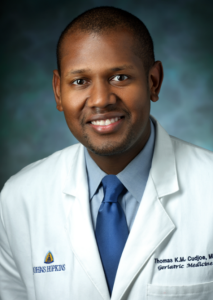 Thomas K.M. Cudjoe, M.D., M.P.H., M.A. is the Robert and Jane Meyerhoff Endowed Professor, Assistant Professor of Geriatric Medicine and Gerontology at the Johns Hopkins School of Medicine. He leverages community-based strategies, mixed-methods and human centered design to understand and address social isolation. Additionally, he has led studies that examined the prevalence of social isolation among older adults and associations between social isolation and health outcomes. Dr. Cudjoe also serves on the Scientific Advisory Council for the Foundation for Social Connection. His work has been featured in the New York Times, Wall Street Journal, NPR, and on Good Morning America.
Thomas K.M. Cudjoe, M.D., M.P.H., M.A. is the Robert and Jane Meyerhoff Endowed Professor, Assistant Professor of Geriatric Medicine and Gerontology at the Johns Hopkins School of Medicine. He leverages community-based strategies, mixed-methods and human centered design to understand and address social isolation. Additionally, he has led studies that examined the prevalence of social isolation among older adults and associations between social isolation and health outcomes. Dr. Cudjoe also serves on the Scientific Advisory Council for the Foundation for Social Connection. His work has been featured in the New York Times, Wall Street Journal, NPR, and on Good Morning America.
Daniel Cumming (Postdoctoral Fellow, Program in Racism, Immigration & Citizenship)
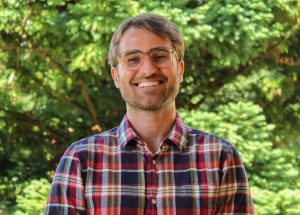 Daniel Cumming is a historian of the 20th-century U.S. and a postdoctoral fellow with the Program in Racism, Immigration, and Citizenship at Johns Hopkins University. His scholarship explores the intersections of housing policy, public health, environmental justice, racial capitalism, and metropolitan history. A recent Ph.D. from New York University, Cumming is writing a book that examines the transformation of racial inequality through the rise of academic medical institutions in 20th-century Baltimore. During the academic year 2022-23, Cumming was a research scholar with Columbia University’s Ira A. Lipman Center for Journalism and Civil and Human Rights, and he previously held fellowships with the Jefferson Scholars Foundation, the Hagley Museum and Library, the National Library of Medicine, and the Maryland Center for History and Culture. He is a former high school teacher at Carver Vocational-Technical High School in Baltimore City.
Daniel Cumming is a historian of the 20th-century U.S. and a postdoctoral fellow with the Program in Racism, Immigration, and Citizenship at Johns Hopkins University. His scholarship explores the intersections of housing policy, public health, environmental justice, racial capitalism, and metropolitan history. A recent Ph.D. from New York University, Cumming is writing a book that examines the transformation of racial inequality through the rise of academic medical institutions in 20th-century Baltimore. During the academic year 2022-23, Cumming was a research scholar with Columbia University’s Ira A. Lipman Center for Journalism and Civil and Human Rights, and he previously held fellowships with the Jefferson Scholars Foundation, the Hagley Museum and Library, the National Library of Medicine, and the Maryland Center for History and Culture. He is a former high school teacher at Carver Vocational-Technical High School in Baltimore City.
Nate Brown (Senior Lecturer, University Writing Program)
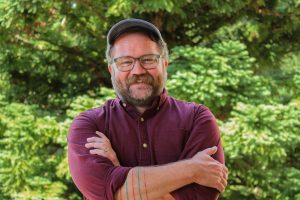 Nate Brown is a writer and editor who holds a BA in English from Cornell University (2004) and an MFA in fiction from the University of Wisconsin-Madison (2008). He began his publishing career at Random House in 2004, and was the founding book page editor of the Brooklyn-based digest, The L Magazine, where he edited reviews and the annual summer fiction issue from 2006-2012. From 2012-2014, he was the Deputy Director of the PEN/Faulkner Foundation in Washington, DC, and he is currently a board member of Writers in Baltimore Schools, a nonprofit dedicated to supporting student writers in Baltimore City.
Nate Brown is a writer and editor who holds a BA in English from Cornell University (2004) and an MFA in fiction from the University of Wisconsin-Madison (2008). He began his publishing career at Random House in 2004, and was the founding book page editor of the Brooklyn-based digest, The L Magazine, where he edited reviews and the annual summer fiction issue from 2006-2012. From 2012-2014, he was the Deputy Director of the PEN/Faulkner Foundation in Washington, DC, and he is currently a board member of Writers in Baltimore Schools, a nonprofit dedicated to supporting student writers in Baltimore City.
Currently, he is the managing editor of the award-winning, Austin-based literary magazine American Short Fiction, and he has taught creative writing and composition at the University of Wisconsin, through the International Writing Program at the University of Iowa, at the George Washington University, Georgetown, and elsewhere.
His areas of interest and research include equity and access in literary publishing, visual rhetoric and writing about art, community-based learning, and sustainability in the nonprofit arts space. Learn more at: https://nate-brown.com/
Morris Speller (Lecturer, University Writing Program)
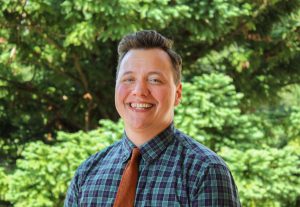 Morris “Mo” Speller teaches in the University Writing Program. His writing courses encourage students to think about how the past informs present-day life in Baltimore. Before becoming a lecturer in the University Writing Program, Mo completed his PhD in History at Hopkins in 2020. He previously taught history courses at Johns Hopkins, Maryland Institute and College of Art (MICA), and at the University of Maryland, Baltimore County (UMBC).
Morris “Mo” Speller teaches in the University Writing Program. His writing courses encourage students to think about how the past informs present-day life in Baltimore. Before becoming a lecturer in the University Writing Program, Mo completed his PhD in History at Hopkins in 2020. He previously taught history courses at Johns Hopkins, Maryland Institute and College of Art (MICA), and at the University of Maryland, Baltimore County (UMBC).
Mo’s primary research examines the history of mortgage discrimination, predatory lending, racial segregation, and housing policy in his hometown of St. Louis. His other research interests include the history of queer communities and “gayborhood” politics in Baltimore and the history of Baltimore neighborhoods displaced by urban renewal. Mo is also on the Board of the Society of American City and Regional Planning Historians, where he serves on the Communications Committee.
Spring 2024 Community-Based Learning Courses
Nothing About Us, Without Us: Storytelling as a Method for Community Organizing – Daniel Cumming
(As.362.326) Tuesday and Thursday, 3:00-4:14pm
This course offers a hands-on opportunity for students to develop new skills as community organizers by learning from the best teachers possible: residents who have been serving their neighborhoods and building grassroots power in Southwest Baltimore since the 1990s. As a community-based learning course partnered with the Center for Social Concern, and co-taught by professors, archivists, cultural curators, and longtime residents, including the founder of Fayette Street Outreach, Ms. Edna Manns-Lake, this course will leverage the narrative power of storytelling to help rewrite a multigenerational history of community organizing in a part of the city long neglected by local government and threatened by open-air drug markets, criminalization, and housing speculators. Through community immersion, including story circles, oral histories, community archiving, local meetings, and guest presentations, students will learn how to navigate, identify, and build upon neighborhood assets. Students will then collaborate with a community partner to co-design and complete a neighborhood project by the end of the semester. Dispelling myths, learning truths, documenting history, and honoring decades of struggle in the face of massive odds, students will help re-write the narrative of Southwest Baltimore, centering humanity and resilience among resident-activists who stayed and fought for their community.
Co Instructors:
Edna Manns-Lake – Fayette Street Outreach, Jeneanne Collins – M.F.A., Tonika Berkley – M.A., Daniel Cumming – Ph.D.
Reproductive Justice in Baltimore – Lisa Wright
In 1994, 12 Black women coined the term Reproductive Justice. Its tenets are 1) the right to have children; 2) the right not to have children; and 3) the right to parent children in safe and healthy environments, free from violence by individuals or the state. Advocates suggest Reproductive Justice requires us to create holistic and transformative conditions for people to have access and full provision to make the best decisions for their lives. In this community-based course, students will engage with The Bloom Collective, a perinatal space in Baltimore focused on providing holistic care, support, and services advancing Reproductive Justice. The course co-educator and director of the Bloom Collective, Tanay Lynn Harris will share her lived experiences of advocating for Reproductive Justice in Baltimore, and guide students in exploring the interconnectedness of Reproductive Justice throughout our everyday lives to reflect on the many ways it shows up in Baltimore City and beyond. Students will write in various genres with varying audiences in the Black maternal health field. This course will culminate with a community gathering that celebrates Black Maternal Health Week where students will have opportunities to listen to members of the Reproductive Justice community and present their research to an audience of their peers.
Community Partner: Bloom Collective
The City That Writes – Matthew Pavesich
In 1988, Baltimore’s first African-American mayor, Kurt Schmoke, declared Baltimore the “city that reads.” In this course, we’ll explore the ways that Baltimore has always been a city that writes, too. In partnership with Wide Angle Youth Media (https://www.wideanglemedia.org), an organization dedicated to “cultivating and amplifying the voices of Baltimore youth through the media arts,” we’ll study how writing fuels the work of the organization, interacts with the residents of Baltimore, and knits together social life in this great city. At the same time we will name, and cultivate, the many ways and reasons to write: to connect with loved ones and the wider world, learn new knowledge and skills, solve problems, and make things happen in the world. Students can expect to write both traditional academic essays and in other forms such as presentations, proposals, case studies, social media campaigns, and more. Many thanks to the Center for Social Concern for its support of our WAYM partnership.
Reintroduction to Writing: Lost Baltimore – Morris Speller
(AS.004.101 (12)) T 1:30PM – 4:00PM and (AS.004.101 (13)) TH 1:30pm-4pm.
How might we write the stories of neighborhoods that no longer exist? In this community-engaged writing course, students will work closely with the Baltimore City Archives to uncover the stories of people who lived in neighborhoods demolished by the Housing Authority of Baltimore City between the 1930s and 1960s. We will examine documents that the Housing Authority generated while acquiring homes for demolition— photographs, appraisal forms, court affidavits, and more—to consider the way these forms of writing impacted the lives of Baltimoreans facing displacement. In the process students will learn strategies for reading mundane, bureaucratic, and even dehumanizing sources against the grain, to find glimpses of the vibrant lives and everyday struggles of ordinary Baltimoreans. Students will critically reflect on the range of texts that they encounter and generate in their own lives as they build an awareness of the many writing decisions and rhetorical strategies they already bring to our work in the classroom. Working in a variety of modes and genres, students will write for both academic and public audiences. The course culminates with a collaboration with local archives and museums: students will research and create texts for a public exhibit on the history of Baltimore neighborhoods that have been lost to urban renewal, gentrification, and other forms of displacement.
Reintroduction to Writing: Music, School & Democracy – Anne-Elizabeth Brodsky
Can youth orchestras fortify a city? What, if anything, does kids making music or art have to do with democratic practice? What happens when we press on the terms play and listen in the contexts of childhood and of neighborhood, city, or country? In this community-engaged course, we will study, experiment with, and rethink writing – all in the context of local K-12 music education. Students will work with and learn from the Baltimore Symphony Orchestra OrchKids program. With these co-teachers, alongside mentors from the Center for Social Concern, we will explore El Sistema pedagogy, the assets of City Schools, and systemic racism and inequity in Baltimore. We will study and write about visual, aural and written texts found in different habitats, including OrchKids classrooms; Sheridan Libraries; Baltimore Museum of Art; Baltimore Banner; and what we see and hear in our everyday lives. In conversation with works by James Baldwin, Danielle Allen, Ada Limon, Judah Adashi, Vesla Weaver, and Jonathon Heyward, students will write critical reflections, personal narrative, academic argument, op-eds, and more. Throughout, we will discuss and rehearse writing as an intellectual, social, and always emerging practice. No artistic background needed; all are welcome. Many thanks to the Center for Social Concern for their support of this course.
Build, Borrow, Repair: Writing With the Station North Tool Library – Nate Brown
(AS.004.351 (02))
In this collaborative, community-based learning course, students will work directly with the staff and volunteers of the Station North Tool Library, Baltimore’s decade-old tool-lending library. Together, we’ll seek to learn more about libraries of things as we study Baltimore’s housing ecosystem and related development and zoning policies. We’ll also work to understand how libraries of things and makerspaces across the country aim to empower individuals to undertake building and maintenance projects of their own. Students will engage in qualitative research, perform interviews with and write profiles about various constituents and stakeholders at the SNTL, and seek to understand how community organizations like the Tool Library are founded, funded, and sustained over time.
Faculty Fellows Through Words and Photos
- 2022-23 Fellows CBL “Lunch and Learn” Panel
- 2022-23 Faculty Fellow Dr. Jasmine Blanks Jones’ Class
- 2022-23 Faculty Fellow Dr. Fadil Santosa’s Class
- 2022-23 Faculty Fellow Dr. Gabrielle Dean’s Class
- 2022-23 Faculty Fellow Dr. Matthew Pavesich’s Class
- 2022-23 Faculty Fellow Dr. Alissa Murphy’s Class
- 2022-23 Faculty Fellow Dr. Anne-Elizabeth Brodsky’s Class
- 2022-23 Faculty Fellow Dr. Victoria Harm’s Class

